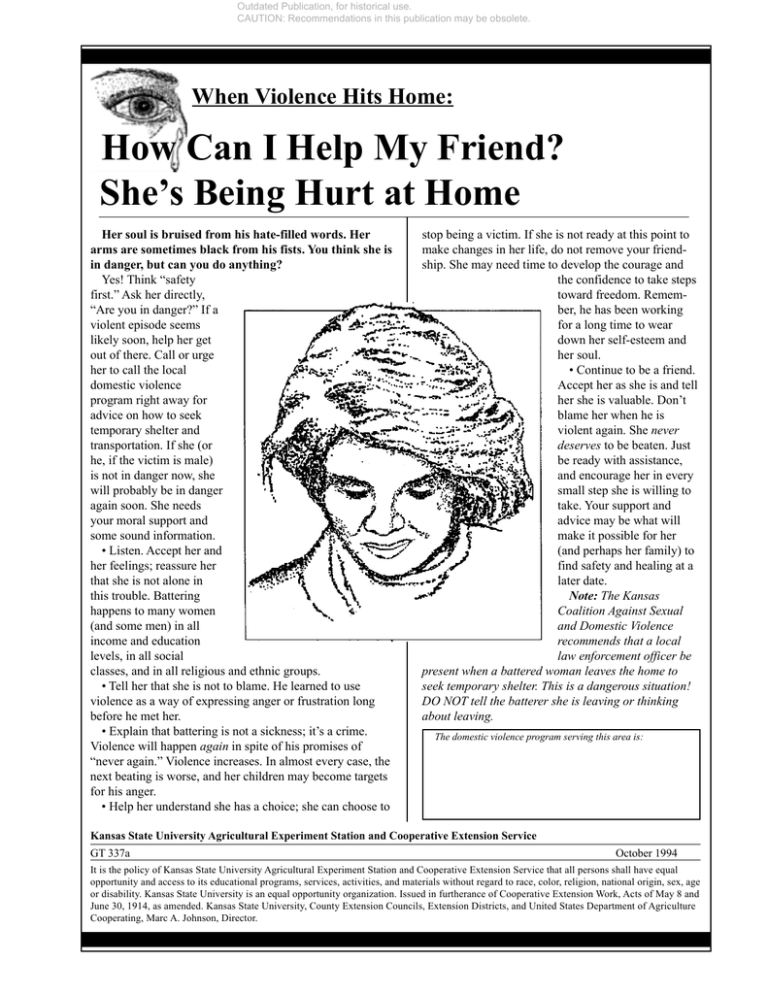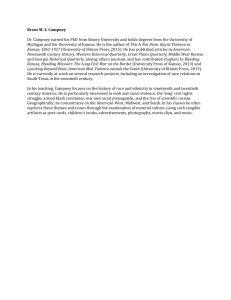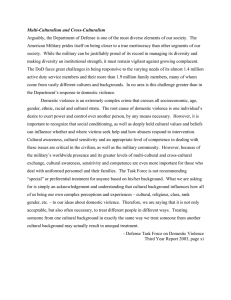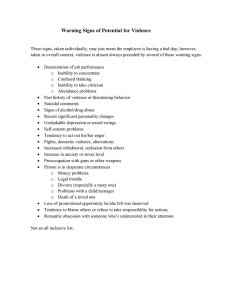
Outdated Publication, for historical use.
CAUTION: Recommendations in this publication may be obsolete.
When Violence Hits Home:
How Can I Help My Friend?
She’s Being Hurt at Home
Her soul is bruised from his hate-filled words. Her
arms are sometimes black from his fists. You think she is
in danger, but can you do anything?
Yes! Think “safety
first.” Ask her directly,
“Are you in danger?” If a
violent episode seems
likely soon, help her get
out of there. Call or urge
her to call the local
domestic violence
program right away for
advice on how to seek
temporary shelter and
transportation. If she (or
he, if the victim is male)
is not in danger now, she
will probably be in danger
again soon. She needs
your moral support and
some sound information.
• Listen. Accept her and
her feelings; reassure her
that she is not alone in
this trouble. Battering
happens to many women
(and some men) in all
income and education
levels, in all social
classes, and in all religious and ethnic groups.
• Tell her that she is not to blame. He learned to use
violence as a way of expressing anger or frustration long
before he met her.
• Explain that battering is not a sickness; it’s a crime.
Violence will happen again in spite of his promises of
“never again.” Violence increases. In almost every case, the
next beating is worse, and her children may become targets
for his anger.
• Help her understand she has a choice; she can choose to
stop being a victim. If she is not ready at this point to
make changes in her life, do not remove your friendship. She may need time to develop the courage and
the confidence to take steps
toward freedom. Remember, he has been working
for a long time to wear
down her self-esteem and
her soul.
• Continue to be a friend.
Accept her as she is and tell
her she is valuable. Don’t
blame her when he is
violent again. She never
deserves to be beaten. Just
be ready with assistance,
and encourage her in every
small step she is willing to
take. Your support and
advice may be what will
make it possible for her
(and perhaps her family) to
find safety and healing at a
later date.
Note: The Kansas
Coalition Against Sexual
and Domestic Violence
recommends that a local
law enforcement officer be
present when a battered woman leaves the home to
seek temporary shelter. This is a dangerous situation!
DO NOT tell the batterer she is leaving or thinking
about leaving.
The domestic violence program serving this area is:
Kansas State University Agricultural Experiment Station and Cooperative Extension Service
GT 337a
October 1994
It is the policy of Kansas State University Agricultural Experiment Station and Cooperative Extension Service that all persons shall have equal
opportunity and access to its educational programs, services, activities, and materials without regard to race, color, religion, national origin, sex, age
or disability. Kansas State University is an equal opportunity organization. Issued in furtherance of Cooperative Extension Work, Acts of May 8 and
June 30, 1914, as amended. Kansas State University, County Extension Councils, Extension Districts, and United States Department of Agriculture
Cooperating, Marc A. Johnson, Director.
Outdated Publication, for historical use.
CAUTION: Recommendations in this publication may be obsolete.
When Violence Hits Home:
How Can I Help My Friend?
She’s Being Hurt at Home
Her soul is bruised from his hate-filled words. Her
arms are sometimes black from his fists. You think she is
in danger, but can you do anything?
Yes! Think “safety
first.” Ask her directly,
“Are you in danger?” If a
violent episode seems
likely soon, help her get
out of there. Call or urge
her to call the local
domestic violence
program right away for
advice on how to seek
temporary shelter and
transportation. If she (or
he, if the victim is male)
is not in danger now, she
will probably be in danger
again soon. She needs
your moral support and
some sound information.
• Listen. Accept her and
her feelings; reassure her
that she is not alone in
this trouble. Battering
happens to many women
(and some men) in all
income and education
levels, in all social
classes, and in all religious and ethnic groups.
• Tell her that she is not to blame. He learned to use
violence as a way of expressing anger or frustration long
before he met her.
• Explain that battering is not a sickness; it’s a crime.
Violence will happen again in spite of his promises of
“never again.” Violence increases. In almost every case, the
next beating is worse, and her children may become targets
for his anger.
• Help her understand she has a choice; she can choose to
stop being a victim. If she is not ready at this point to
make changes in her life, do not remove your friendship. She may need time to develop the courage and
the confidence to take steps
toward freedom. Remember, he has been working
for a long time to wear
down her self-esteem and
her soul.
• Continue to be a friend.
Accept her as she is and tell
her she is valuable. Don’t
blame her when he is
violent again. She never
deserves to be beaten. Just
be ready with assistance,
and encourage her in every
small step she is willing to
take. Your support and
advice may be what will
make it possible for her
(and perhaps her family) to
find safety and healing at a
later date.
Note: The Kansas
Coalition Against Sexual
and Domestic Violence
recommends that a local
law enforcement officer be
present when a battered woman leaves the home to
seek temporary shelter. This is a dangerous situation!
DO NOT tell the batterer she is leaving or thinking
about leaving.
The domestic violence program serving this area is:
Kansas State University Agricultural Experiment Station and Cooperative Extension Service
GT 337a
October 1994
It is the policy of Kansas State University Agricultural Experiment Station and Cooperative Extension Service that all persons shall have equal
opportunity and access to its educational programs, services, activities, and materials without regard to race, color, religion, national origin, sex, age
or disability. Kansas State University is an equal opportunity organization. Issued in furtherance of Cooperative Extension Work, Acts of May 8 and
June 30, 1914, as amended. Kansas State University, County Extension Councils, Extension Districts, and United States Department of Agriculture
Cooperating, Marc A. Johnson, Director.





